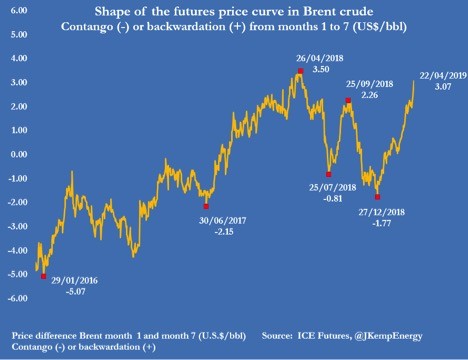U.S. Does Not Renew Sanctions Waivers
As largely predicted, on April 22, 2019, the United States announced that it would end sanctions waivers to those countries previously granted waivers to purchase Iranian crude.
Already, U.S. sanctions have had an impact on Iranian oil exports. However, eight countries had been granted exemptions and allowed to continue importing Iranian crude. The eight buyers are China and India — Iran's biggest customers — as well as Japan, South Korea, Turkey, Italy, Greece, and Taiwan. The waivers have allowed Iran to continue exporting about 1 million barrels per day, down from roughly 2.5 million bpd last year.
This sent oil markets surging higher as both Venezuela and Iran are now, theoretically, partially offline.
In a joint statement issued Monday, Saudi Arabia and the United Arab Emirates joined the United States in insuring the world that crude supplies would not be disrupted as both Saudi Arabia and the UAE pledged to make up any differential. In its official release, the White House stated, "The United States, Saudi Arabia, and the United Arab Emirates, three of the world's great energy producers, along with our friends and allies, are committed to ensuring that global oil markets remain adequately supplied. We have agreed to take timely action to assure that global demand is met as all Iranian oil is removed from the market."
Perhaps more interesting though, is the U.S. State Department's view of oil markets. In its briefing, the U.S. State Department asserts the following:
- Oil markets are well supplied and oil inventory levels are seasonally strong.
- We have commitments from oil producing countries, including the Kingdom of Saudi Arabia and the United Arab Emirates, to increase oil production to offset reductions in Iranian oil exports.
- Rising Non-OPEC (Organization of the Petroleum Exporting Countries) oil production and sufficient storage levels show that the adjustment to replace Iranian oil exports has been successful.
- The United States and other non-OPEC oil producers have already increased production and replaced Iranian exports, while other major producers have signaled to markets a willingness and ability to increase production to compensate for additional Iranian reductions.
- Non-OPEC output, led by the United States, is forecast to expand by 2.2 million barrels per day in 2019 and 2020, according to the U.S. Department of Energy's Energy Information Administration (EIA).
- OECD (Organization for Economic Co-operation and Development), including U.S. industry-held, oil stocks remain above 5-year averages, according to the International Energy Agency (IEA).
However, oil traders seem to be taking a sharply different view. Brent crude oil futures rose 0.7 percent to $74.57 per barrel by 0630 GMT, their highest since November, after Washington said it was ending all sanctions waivers for countries buying Iranian oil.
BRENT's six-month calendar spread has hit $3.07 backwardation, the highest since Mar-Apr 2018 (when Iran sanctions were also high on the agenda) and before that Jun 2014 (when Libya's production was interrupted by civil war and Islamist fighters were racing across northern Iraq):
BRENT's six-month calendar spread is now in the 88th percentile of the distribution post-1990, so while the U.S. State Department judges the oil market is well supplied, and will remain so after the tightening of sanctions on Iran, oil traders take a different view.
And some countries seem to be fighting it – particularly China.China and Turkey publicly lashed out against the U.S. decision. And analysts are debating if China will stop buying crude from Iran.
The move into strong backwardation indicates that traders are highly cynical of the U.S. State Departments optimism as to well supplied oil markets.And further reflects their cynicism that Saudi Arabia and the United Arab Emirates will make up the difference as long as oil supplies remain above their five year average.
By accepting you will be accessing a service provided by a third-party external to https://fsmetals.com/


